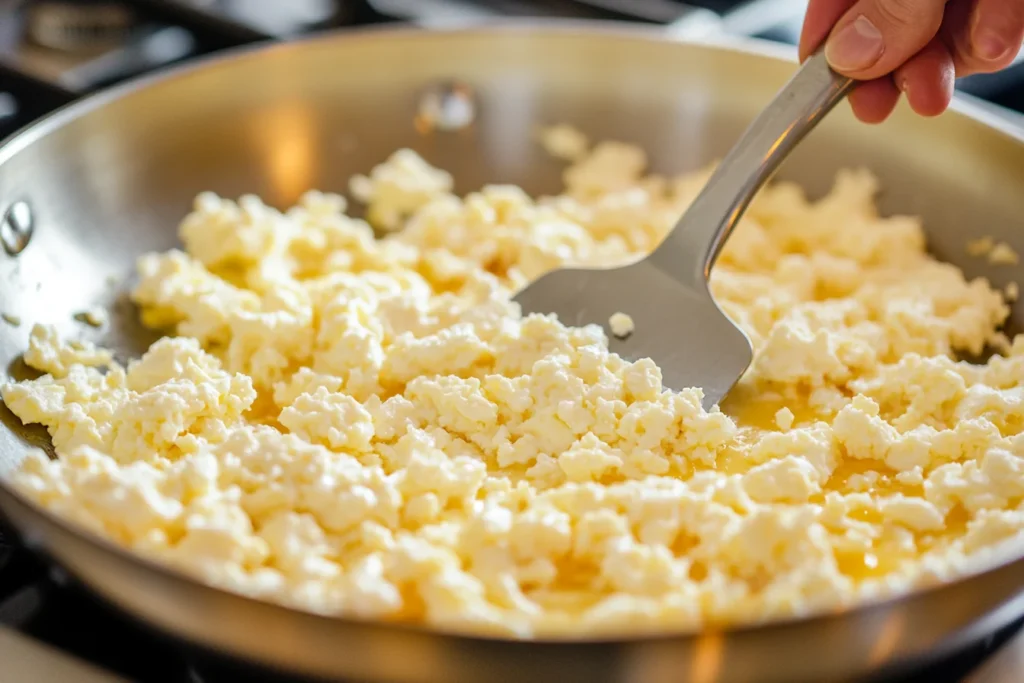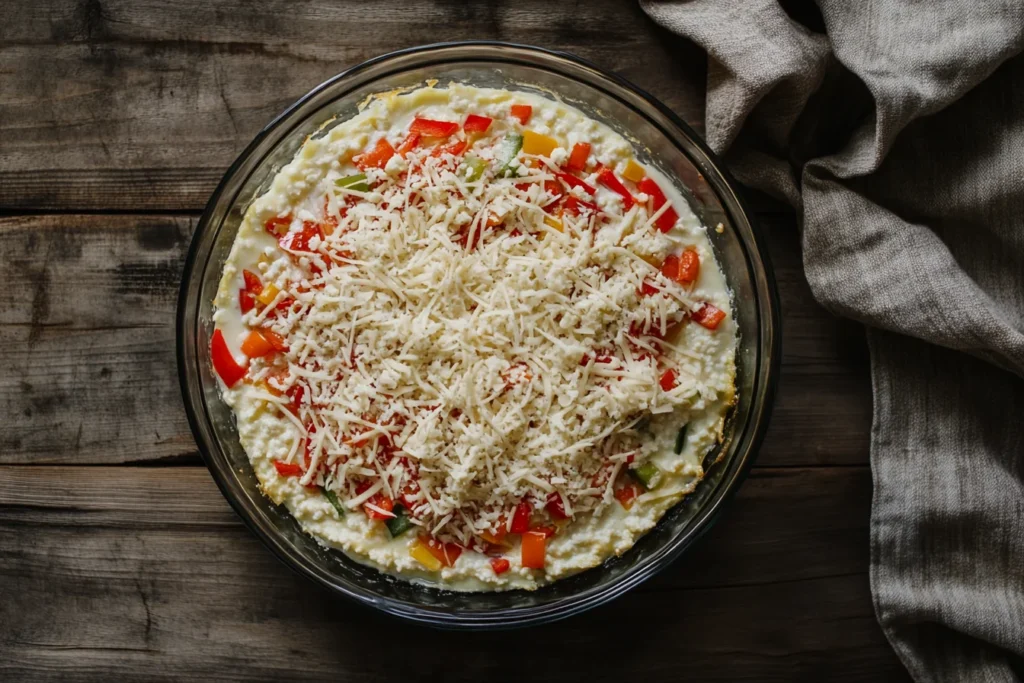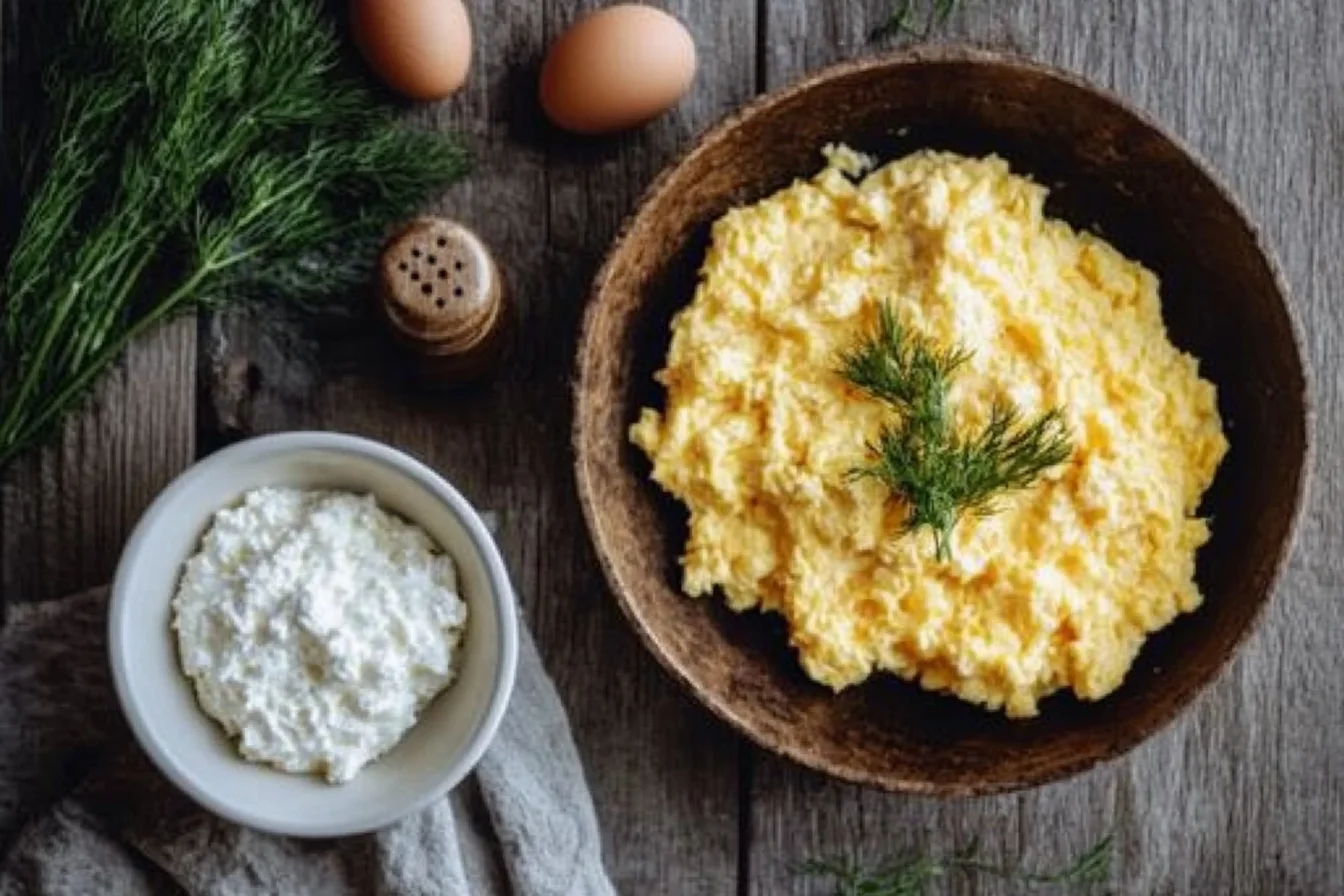Table of contents
Introduction
Alright, folks, let’s talk about a food pairing that might raise an eyebrow or two: cottage cheese and eggs. Yeah, I know, it’s not exactly the classic duo like peanut butter and jelly or bacon and… well, more bacon. However, before you wrinkle your nose, hear me out. This combination is actually a bit of a secret weapon for health-conscious foodies and, dare I say, those looking for a textural and flavor adventure. We’re going to dig into whether these two seemingly disparate ingredients actually play nice together, exploring flavor profiles, nutritional benefits, and creative ways to make this pairing a delicious part of your life.
Does Cottage Cheese Taste Good with Eggs?
So, let’s get down to brass tacks. Does this unusual pairing actually taste good? The short answer: it depends! It’s all about understanding the inherent flavors of both cottage cheese and eggs and then playing to their strengths. Think of it like a good marriage – two different individuals coming together to create something wonderful (or, at least, not disastrous).
Cottage Cheese: The Mellow Player
Cottage cheese is, by nature, a mild and slightly tangy cheese. It has a creamy, sometimes lumpy texture that can be a real make-or-break situation for some. Its flavor isn’t bold or overpowering. Instead, it offers a subtle milky sweetness with a characteristic slight acidity. Think of it as the laid-back friend in the food group, happy to hang out and complement others. Its saltiness is also a factor that can be highlighted or toned down depending on what you add it to. In addition, the type of milk used to make the cottage cheese (whole, low-fat, or non-fat) can influence its richness and flavor profile.
Eggs: The Versatile Star
Eggs, on the other hand, are the chameleons of the culinary world. They can be scrambled, fried, poached, baked—you name it! The flavor of an egg, while mild, can lean in different directions based on its preparation. A lightly scrambled egg will have a delicate, creamy flavor, while a fried egg has a more pronounced richness, particularly if cooked in butter or oil. Basically, they’re the star quarterback, ready to do their part no matter how the play unfolds. Also, the source of the eggs matters; free-range eggs, for example, often have a richer yolk and flavor compared to conventional eggs. Consequently, the versatility of eggs makes them an excellent partner for exploring various flavor combinations.
The Compatibility Conundrum: Can They Coexist?
Now, the million-dollar question: can these two diverse culinary personalities get along? The answer, as with most things in life, is a resounding “it depends.” You see, when you introduce cottage cheese to eggs, there’s a chance for both delicious harmony and unfortunate clashes. It’s all about finding the right balance.
The Potential for Greatness
When done right, cottage cheese and eggs can create a delightful textural and flavor experience. Here’s where the magic happens:
- Creamy Contrast: The creamy, slightly lumpy texture of cottage cheese adds an interesting contrast to the soft, often smooth texture of cooked eggs. It’s a pleasant mouthfeel experience.
- Mildly Tangy Kick: The subtle tanginess of cottage cheese can cut through the richness of eggs, preventing them from becoming too heavy or monotonous, a big plus for those seeking balance.
- Flavor Amplification: While both ingredients are mild on their own, they can combine to create a more complex and nuanced flavor profile. The slight saltiness in cottage cheese, for instance, enhances the natural savory notes in eggs.
- Texture Boost: Moreover, the curds in cottage cheese add tiny pockets of moisture and chewiness to egg dishes, making every bite a little more interesting.
The Potential Pitfalls
It’s not all sunshine and rainbows, though. There are some potential hurdles to jump:
- Texture Troubles: For some, the combination of a lumpy cheese with cooked eggs can be… well, let’s just say not appealing. It’s definitely a texture-forward experience, so if you’re sensitive to that, it might take some getting used to. Certainly, not everyone enjoys the texture variation, and it might take a couple of attempts to find the right balance.
- Flavor Clashes: If not seasoned properly, the mild tanginess of cottage cheese could clash with certain egg preparations. For example, the mild flavor of a plain boiled egg might not be able to stand up to the tanginess of the cottage cheese without some added flavors.
- Wateriness Woes: Some brands of cottage cheese can be quite watery and might make your eggs soggy. This is easily avoided with proper draining or by using a thicker variety. In addition, using a lower-fat cottage cheese could exacerbate this problem, so choosing a full-fat option might be preferable.
- Overpowering Taste: Also, using too much cottage cheese can overwhelm the delicate flavor of eggs, resulting in a dish that tastes more of cheese than eggs.
Ways to Make Cottage Cheese with Eggs a Delicious Duo
Okay, so you’re still with me, which means you’re at least a little intrigued. Let’s talk about how to make this pairing work wonders, turning it from a strange experiment to a regular go-to.
The Scrambled Secret Weapon

One of the easiest and most effective ways to incorporate cottage cheese into your eggs is through scrambled eggs. Here’s the lowdown:
- Mix it In: After cooking your eggs and just before taking them off the heat, stir in a spoonful or two of cottage cheese. Don’t overmix; you want to maintain some texture. Similarly, if you prefer a smoother consistency, you can slightly mash the cottage cheese before adding it.
- Seasoning is Key: Add salt, pepper, and a pinch of herbs to enhance the flavor. Dill, chives, and parsley work particularly well. Also, consider adding a pinch of garlic powder or a dash of red pepper flakes for a little extra zing.
- Don’t Overcook: Cooking the cottage cheese for too long can make it watery. Add it in the last minute for best results. Consequently, this prevents the cheese from breaking down and changing its texture.
- The Low Heat Method: Cook the scrambled eggs over low to medium heat to avoid over-drying the egg. Also, using a non-stick pan can help prevent the eggs from sticking and burning.
Omelets Get a Lift
Omelets are another great vehicle for cottage cheese.
- The Filling Superstar: Fill your omelet with cottage cheese and other goodies like spinach, mushrooms, and tomatoes. Not only that, but adding sautéed onions or bell peppers can enhance the flavor and nutritional value of your omelet.
- Herby Delight: Incorporate fresh or dried herbs into the cottage cheese for added flavor. For example, a combination of oregano and basil can give your omelet an Italian-inspired twist.
- The Cheese-Lover’s Dream: Go all-in and add another cheese or two, such as feta or goat cheese, for an even more complex flavor profile. However, be mindful of the salt content, especially if using feta.
- Cook with Care: Don’t overcook the omelet. You want the eggs to be tender and the cottage cheese warm, not dried out. Also, using a spatula to gently fold the omelet can prevent it from breaking.
Cottage Cheese as a Topping: The Simple Approach
Sometimes simplicity is best. Instead of mixing cottage cheese into your eggs, try using it as a topping.
- Fried Egg Friend: Spoon a dollop of cottage cheese on top of a fried egg. Certainly, this works best with eggs that have a runny yolk, as the yolk can mix with the cottage cheese for a delicious sauce.
- Poached Egg Pal: Try topping your poached eggs with cottage cheese and herbs to make your own simple yet tasty dish. Besides, a sprinkle of smoked paprika can add a layer of flavor.
- The Savory Sprinkle: Add a sprinkle of everything bagel seasoning, red pepper flakes, or a drizzle of olive oil for extra flavor. Additionally, a sprinkle of chopped green onions or chives can bring a freshness.
- The Quick Fix: This approach is incredibly fast and requires minimal effort. Therefore, it is ideal for those busy mornings when you need a quick and healthy meal.

Cottage Cheese Egg Bakes: A Crowd-Pleaser
For a heartier meal, consider an egg bake with cottage cheese. This is a fantastic option for meal prep or weekend brunches.
- Layered Goodness: Layer cottage cheese, eggs, vegetables, and your choice of protein in a baking dish. Including layers of sautéed vegetables like spinach, onions, and peppers enhances the taste and texture of the dish.
- Season Generously: Make sure to season your egg mixture with salt, pepper, garlic powder, and any other herbs or spices you enjoy. Of course, a pinch of nutmeg or cumin can add depth of flavor.
- Bake Until Set: Bake the dish until the eggs are set and the top is golden brown. Also, using a meat thermometer to test the temperature can guarantee that the eggs are fully cooked.
- Personalize it!: The flexibility of egg bakes allows you to customize them to your heart’s desire with different proteins or veggies. For example, adding crumbled sausage or chopped ham provides a heartier meal, while using roasted vegetables provides a more delicate option.

The Nutritional Power Couple: Cottage Cheese and Eggs
Beyond flavor, this pairing has some serious nutritional advantages. Let’s take a look at why this might be a great combo for your health.
Protein Powerhouse
Both cottage cheese and eggs are excellent sources of protein, which is essential for building and repairing tissues, keeping you feeling full and satisfied, and supporting overall health. Protein is the backbone of many processes in the body, and it is always beneficial to have a good amount of it. Therefore, combining these two ingredients is a great way to boost your protein intake. Also, the high protein content makes this combination ideal for athletes and those trying to build muscle.
Nutrient-Rich Duo
Eggs are packed with vitamins and minerals, including vitamin D, vitamin B12, choline, and selenium. Cottage cheese offers calcium, phosphorus, and vitamin B12. Together, they provide a well-rounded nutritional profile. In addition, cottage cheese is a good source of riboflavin, which is important for energy production. Similarly, the choline in eggs is essential for brain function and development.
Low-Carb Friendly
This pairing is naturally low in carbohydrates, making it a good option for those following a low-carb or ketogenic diet. This makes it easy to control your weight and diet if your doctor advises you to eat lower carbohydrates. Consequently, this combination is popular among individuals seeking to control their blood sugar levels.
Satiety Satisfier
The high protein and healthy fats content of cottage cheese and eggs makes for a highly satisfying and filling meal that will keep you feeling full for longer periods of time, which can help in weight management. Because of this, a breakfast that includes both eggs and cottage cheese can help reduce snacking between meals.
Addressing Common Concerns About Cottage Cheese and Eggs
I know, I know. You might still have some reservations. Let’s tackle some of those common concerns about cottage cheese and eggs head-on.
The Texture Thing
- Start Small: If you’re new to the texture, start with a small amount of cottage cheese and gradually increase it as you become more comfortable. For example, you could start with just a tablespoon mixed into your scrambled eggs.
- Blend it: If the lumps are truly a deal-breaker, try blending the cottage cheese before adding it to your eggs. This will make it much smoother. Also, you can use an immersion blender to achieve a creamy consistency.
- Embrace the Variation: Sometimes, it’s worth stepping outside of your comfort zone to explore different textures. While it might not be your immediate favorite, it could grow on you over time.
The Flavor Factor
- Seasoning is Your Friend: Don’t be shy with seasonings. Salt, pepper, herbs, and spices can make a huge difference. Even a simple dash of salt can enhance the flavors of both cottage cheese and eggs.
- Acidic Touch: A squeeze of lemon or a dash of hot sauce can also brighten up the flavor profile. Similarly, a splash of apple cider vinegar can also add a tangy twist.
- Variety is the Spice of Life: Experiment with different types of cottage cheese (e.g., low-fat, full-fat, small curd, large curd) to see which one you prefer with your eggs. Therefore, you might discover that one type of cottage cheese pairs better with eggs than another.
The Wateriness Worry
- Drain it Well: If your cottage cheese seems particularly watery, drain it in a fine-mesh sieve before adding it to your eggs. This simple step can make a huge difference in the texture of the final dish.
- Choose Wisely: Opt for brands with a thicker consistency. Also, reading reviews and descriptions can help you select a brand with a thicker texture.
- Don’t Overcook: Avoid adding cottage cheese too early in the cooking process, which can lead to a watery result. Finally, adding it towards the end of the cooking process helps maintain its texture.
Cottage Cheese and Eggs: Beyond Breakfast
While cottage cheese and eggs are often thought of as breakfast staples, they can be enjoyed at any time of day. Let’s explore some other possibilities.
Lunchtime Loveliness
Salad Superstar: Add hard-boiled eggs and a scoop of cottage cheese to your salad for a boost of protein and flavor. In addition, you could use the cottage cheese as a dressing, mixing it with some herbs and lemon juice.
Stuffed Veggie Treat: Fill bell peppers or zucchini boats with a mixture of cottage cheese, eggs, and vegetables. Also, baking them with a sprinkle of cheese on top makes them more tasty.
Savory Sandwich Savior: Use cottage cheese and sliced hard-boiled eggs as a filling for a sandwich or wrap. Similarly, adding some avocado and a slice of tomato makes a satisfying and nutritious lunch.
Dinner Delights
- Frittata Fun: Incorporate cottage cheese and eggs into a frittata along with your favorite vegetables. Not only that but this is a great way to use up any leftover vegetables.
- Casserole Champion: Create a cheesy casserole with cottage cheese, eggs, and lean protein. Including layers of whole wheat bread or cooked potatoes can make it more filling.
- Light and Fresh: Use cottage cheese and a poached egg as a light but satisfying dinner. For example, adding a side of whole grain toast with a drizzle of olive oil can turn it into a complete dinner.
Snack Time Success
- Protein-Packed Snack: A small bowl of cottage cheese with a sliced hard-boiled egg is a great way to satisfy mid-day cravings. Additionally, a sprinkle of nuts and seeds can add healthy fats and fiber.
- Dippy Delight: Use hard-boiled eggs as dippers for cottage cheese. Even adding a pinch of paprika or other spices can enhance the flavor.
Conclusion
So, does cottage cheese actually taste good with eggs? The answer, it seems, is a resounding “it can!” While it may not be the most conventional pairing, it has the potential to be a delicious and nutritious addition to your diet. By understanding the flavor profiles and textures of both ingredients and by employing some simple cooking techniques, you can unlock the full potential of this dynamic duo. Don’t be afraid to experiment with different recipes and seasoning combinations to find what works best for you. Ultimately, the best way to know if you like something is to give it a try.

